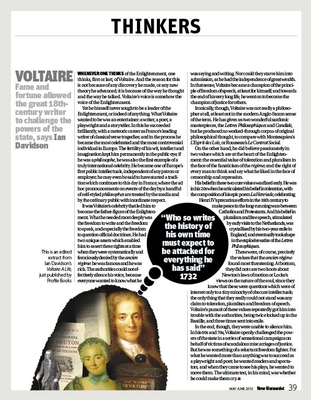 Whenever one thinks of the Enlightenment, one thinks, first or last, of Voltaire. And the reason for this is not because of any discovery he made, or any new theory he advanced; it is because of the way he thought and the way he talked. Voltaire’s voice is somehow the voice of the Enlightenment.
Whenever one thinks of the Enlightenment, one thinks, first or last, of Voltaire. And the reason for this is not because of any discovery he made, or any new theory he advanced; it is because of the way he thought and the way he talked. Voltaire’s voice is somehow the voice of the Enlightenment.
Yet he himself never sought to be a leader of the Enlightenment, or indeed of anything. What Voltaire wanted to be was an entertainer: a writer, a poet, a playwright and a storyteller. In this he succeeded brilliantly, with a meteoric career as France’s leading writer of classical verse tragedies; and in the process he became the most celebrated and the most controversial individual in Europe. The fertility of his wit, intellect and imagination kept him permanently in the public eye; if he was a philosophe, he was also the first example of a truly international celebrity. He became one of Europe’s first public intellectuals, independent of any patron or employer; he may even be said to have started a tradition which continues to this day in France, where the ad hoc pronouncements on events of the day by a handful of self-styled philosophes are treated by the media and by the ordinary public with inordinate respect.
It was Voltaire’s celebrity that led him to become the father-figure of the Enlightenment. What he needed most deeply was the freedom to write and the freedom to speak, and especially the freedom to question official doctrines. He had two unique assets which enabled him to assert these rights at a time when they were systematically and ferociously denied by the ancien régime: he was famous and he was rich. The authorities could not effectively silence his voice, because everyone wanted to know what he was saying and writing. Nor could they starve him into submission, as he had the independence of great wealth. In that sense, Voltaire became a champion of the principle of freedom of speech, at least for himself; and towards the end of his very long life, he went on to become the champion of justice for others.
Ironically, though, Voltaire was not really a philosopher at all, at least not in the modern Anglo-Saxon sense of the term. He has given us two wonderful sardonic masterpieces, the Lettres Philosophiques and Candide, but he produced no worked-through corpus of original philosophical thought, to compare with Montesquieu’s L’Esprit des Lois, or Rousseau’s Le Contrat Social.
On the other hand, he did believe passionately in two values which are at the heart of the Enlightenment: the essential value of toleration and pluralism in the face of the fanaticism of the régime; and the right of every man to think and say what he liked in the face of censorship and repression.
His belief in these two core values was fixed early. He was in his 20s when he articulated his belief in toleration, with the composition of his epic poem La Henriade, celebrating Henri IV’s precarious efforts in the 16th century to make peace in the long-running wars between Catholics and Protestants. And his belief in pluralism and free speech, stimulated by early visits to the Netherlands, was crystallised by his two-year exile in England, and eventually took shape in the explosive satire of the Lettres Philosophiques.
These were, of course, precisely the values that the ancien régime found most threatening. At bottom, they did not care two hoots about Newton’s laws of motion or Locke’s views on the nature of the soul, since they knew that these were questions which were of interest only to a tiny minority of obscure intellectuals; the only thing that they really could not stand was any claim to toleration, pluralism and freedom of speech. Voltaire’s pursuit of these values repeatedly got him into trouble with the authorities, being twice locked up in the Bastille, and three times sent into exile.
In the end, though, they were unable to silence him. In his 60s and 70s, Voltaire openly challenged the powers of the state in a series of sensational campaigns on behalf of victims of scandalous miscarriages of justice. But he was something of a reluctant freedom fighter. For what he wanted more than anything was to succeed as a playwright and poet; he wanted readers and spectators, and when they came to see his plays, he wanted to move them. The ultimate test, in his mind, was whether he could make them cry.

